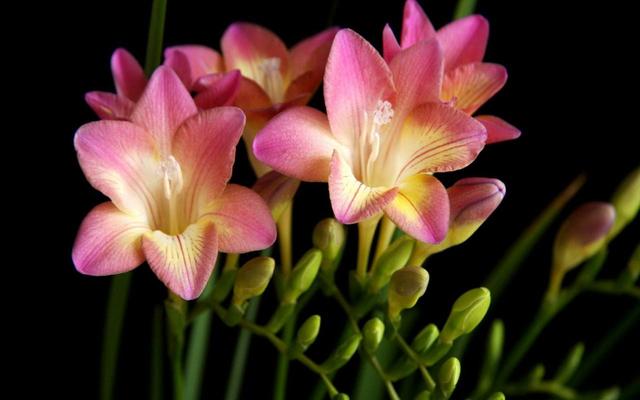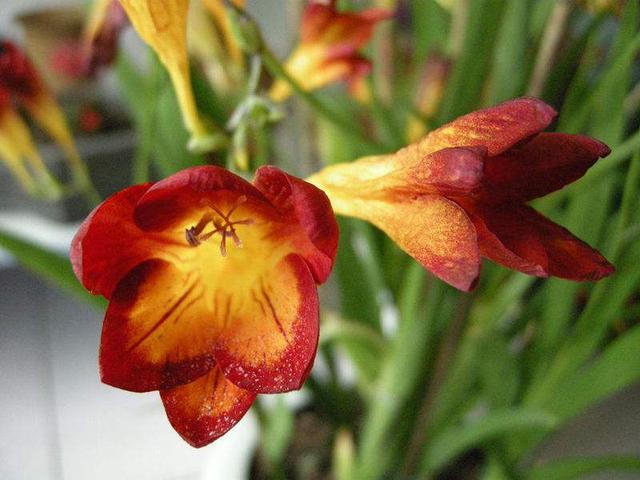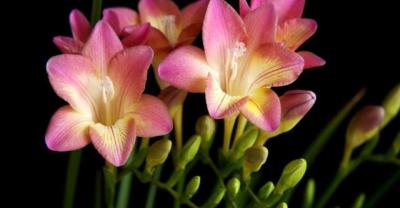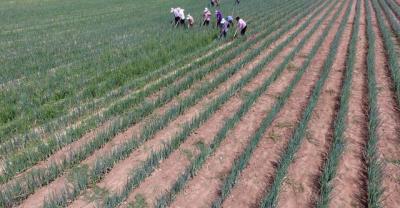How to grow fragrant snow orchid? Propagation methods and planting techniques of Xiangxue Orchid
Fragrant Xuelan (Fressia hybrida Klatt.) Also known as freesia, calamus orchid, scissors orchid, plain vanilla, fragrant iris, evening fragrant jade, belongs to the perennial bulbous herbaceous flowers of Iridaceae. Beautiful, and has a strong fragrance of flowers, so many consumers use it as a family potted plant, and now many people like to grow their own fragrant cherries, so that fragrant flowers have a more sense of achievement when they bloom. Today, let's follow the editor to take a look at the breeding methods and planting techniques of sweet cherry, so that we all know how to grow them.

The Beautiful Legend of Xiang Xuelan
According to legend, this flower was still in the wild at the beginning of the 18th century. One day a noble lady in the Netherlands sympathized with people hunting in South Africa. She saw this strange flower for the first time and loved it very much. Later, she dug it herself and brought it back to Europe. The fragrant flowers were blown into the snow by the wind along the way. as a result, even the ice and snow were stained with a strong aroma. After that, people gave this flower a beautiful name: "Xiangxuelan".
Propagation method of Xiangxue orchid
1. Reproduce by dividing balls
Bulb propagation is the main propagation method of Xiangxue orchid. After the plant was dead and dormant, the underground bulb was dug out, and at this time the mother ball had withered, and a new ball and several daughter balls were produced on it. Generally, the diameter of the new ball was above 1cm, and it could blossom after planting, and the seed ball with a diameter larger than 1cm could also be used as a flowering mother ball, and the effect was better. Those less than 1cm had to propagate for 1-2 years before they could make a flowering mother ball. The bulb also has the habit of dormant at high temperature, which is dug up and stored in a ventilated and dry place.
2. Seed propagation
The cut flower varieties can be propagated by seeds, and the seeds can be collected in time after the seeds are mature from May to June, otherwise the capsule will crack, the seeds will be lost, and the seeds will have no dormancy habit and can be sown immediately after harvest. The optimum temperature for seed germination was 15-20 ℃, and the germination time was about 21 days under dark conditions. When the seedlings had 5-7 leaves, the aboveground parts were withered and yellow, and the underground corms entered the period of high temperature dormancy. After dormancy, the seed balls can be planted and cultivated for 1 year, and then they can be used as flowering mother balls.
The flowering bulb can be obtained in one year by raising seedlings in container. The specific method is as follows: after the seeds were harvested from May to June, they were sown in the greenhouse, and after emergence, they were cultivated in containers in the greenhouse, kept at room temperature for 1518 ℃, and given good water and fertilizer. From May to June of the following year, the diameter of bulbs can reach more than 10m, which can be directly used as flowering bulbs.
3. Tissue culture propagation
At present, tissue culture propagation of Xiangxue orchid has been used in production. For example, virus-free seedlings have been mass produced in some developed countries, and the explants used are young buds. The culture conditions are as follows: temperature 20: 25 ℃, light intensity 1500Lux, pH 5.8.

Planting skills of Xiangxue Orchid
The cultivation of fragrant snow orchid is mainly to provide flowers in winter and spring.
1. Soil preparation
Before cultivation, the cultivated soil should be deeply turned, fertilized and disinfected, and the ploughing depth should be at least 20~30cm. Generally speaking, the amount of base fertilizer should be controlled at 100g of N, P, K compound fertilizer per square meter, and the proportion is 12 ∶ 10 ∶ 18. Steam disinfection or chemical disinfection can be used to disinfect the soil. Disinfect with highly toxic agents should be fully dried before use. To avoid harm to people and plants. Then make a high bed with high 10cm and wide 1~1.2cm.
2. Colonization
The planting time is determined according to the time it takes, and it is generally planted 3-4 months before use. Generally speaking, the corms or newly purchased corms stored at 31 ℃ are still dormant, so the bulbs should be treated at the temperature of 2-3 weeks and 13-17 ℃, and then planted, so that the seedling stage can be consistent and the expected flowering can be achieved. During the treatment, the bulb can be placed in a container or underground, placed in a thin layer, the treatment room temperature is controlled at 13-17 ℃, the relative humidity is 80%, and the ventilation is maintained. Every day, when the bulb is found to have a slight bud or root process, it is planted immediately (if the root system or bud has been replanted, it is easy to damage the root bud).
Low temperature and high humidity can promote flowering after dormancy, the treatment temperature is 8: 10 ℃, the humidity is 90%, and the time is 2: 3 weeks. Such as summer and autumn planting, the greenhouse temperature is too high, you can also put the bulb in moist peat or sawdust, put it in a low-temperature cold storage with a temperature of 8: 10 ℃ for 30 to 40 days, wait for the root system to grow, but be careful not to hurt the root system during cultivation, which can save a large area of greenhouse cooling energy and advance the flowering period.
The planting density varies with variety, bulb size and cultivation season. The narrow leaf variety is denser than the broad leaf variety, and the planting density is 80 × 100 plants per square meter, that is, 10cm × 10cm or 10cm × 12cm.
3. Depth and coverage
Generally speaking, the planting depth of Xiangxue orchid is determined by climate, soil and bulb size, and the soil cover depth is generally twice the size of the bulb. The corm can also be buried in winter, but the soil is shallower; in summer, it can be slightly deeper to reduce the effect of high temperature on the corm, and a little deeper soil cover is beneficial to the growth and flowering, and to the full development of the lower root system at the base of the mother ball and the upper root system at the base of the new ball.
After cultivation, such as high temperature, the soil surface can be covered with a thin layer of peat or pine needles, straw and other heat preservation, to prevent soil surface hardening and prevent the growth of weeds.
4. Water management
Water should be watered immediately after planting, and sufficient water supply should be given until the new buds are unearthed. Drip irrigation is better, sprinkler irrigation, must pay attention to prevent; brush topsoil to make the bulb exposed. After rooting, properly reduce the water supply and keep it moist. After flowering, try to keep the soil dry and replenish water only in the morning, so that the soil surface is slightly dry in the afternoon, so as to reduce air humidity and prevent the occurrence of diseases and insect pests.
5. Temperature management
Both root formation and flower bud differentiation need cool environment. The root system grows best under the condition of 15-18 ℃, the flower bud differentiation is the best at 12-15 ℃, and the inflorescence grows fastest at 18-20 ℃. Therefore, at the initial stage of planting, the inflorescence development could not be reversed when the room temperature was kept at 15: 18 ℃ at the initial stage of planting, and the flower primordium was induced at 12: 15 ℃ at 5: 7 leaf stage, and then heated to 16: 17 ℃ to make the inflorescence elongate rapidly and enter the flowering stage.
6. Nutrition management
If the soil is more fertile, you can top fertilizer at 4 to 5 leaves, otherwise you should top fertilizer at 2 to 3 leaves. Only N fertilizer could be applied at the initial stage, P and K should be added during flower bud differentiation, the ratio of P and K was 1 ∶ 1 ∶ 1, 20~30g/ square meters, and fertilized for 3 to 5 times during the growing period.
7. Light and climate
Xiangxuelan likes plenty of sunshine and relatively low temperature. At 15C or room temperature, the plant can grow normally and healthily, but when the temperature or room temperature exceeds 20C, the plant is easy to lodge because of overgrowth, or do not love flowers. When the outdoor temperature is below 15 degrees, it should be moved indoors immediately, and it should be placed indoors with a room temperature of 15-18C throughout the winter. .
In areas with higher latitudes (above 38N), it is better to supplement light in winter, the supplementary light intensity is conducive to photosynthesis and blossom early, and the effect of supplementing light intensity with high-pressure sodium lamp with reflective binding is good, but continuous light is not conducive to flower bud differentiation. While replenishing light, we should pay attention to the concentration of carbon dioxide in the greenhouse, ventilate as much as possible to ensure the concentration of carbon dioxide or use a carbon dioxide generator to supplement carbon dioxide to the greenhouse. Summer cultivation should be shaded, shading is limited to 30%.
8. Pull the net
Fragrant cymbidium has thinner stems and more flowers, so it is easy to lodge. It is necessary to set up a net in front of 3 leaves, set up a total of 2-3 layers, and keep a grid and a plant. Flower harvesting, processing and market harvesting.
When the first floret on the flower branch is fully colored, it is a suitable harvest time, early in the morning or evening, sometimes several flower branches grow on a bulb, if the lateral branch inflorescence is small and the number of flowers is small, it should be cut off as soon as possible, leaving only one or two flower branches. If it is consumptive cultivation when cutting flowers, it can be cut from the base. If the ball is harvested at the same time, all the basal leaves should be retained, and the water and fertilizer management of the plant should be strengthened until 2 or 3 weeks before the harvest, so that the new ball and seed ball can grow further.
This is the end of the relevant information about Xiang Xuelan. I hope this article will be helpful to you.
- Prev

How to choose plastic film when growing vegetables and why only black plastic film is used to grow strawberries?
Plastic film is used for plastic film mulching. Plastic film mulching is achieved in almost all facility vegetables, even in open field vegetables.
- Next

How to plant bonsai of Populus tomentosa what are the matters needing attention in planting Populus tomentosa
Pearl boxwood bonsai how to plant pearl boxwood what are the matters needing attention? Pearl boxwood is a kind of alpine tree species, do not put it in the sun when planting.
Related
- Fuxing push coffee new agricultural production and marketing class: lack of small-scale processing plants
- Jujube rice field leisure farm deep ploughing Yilan for five years to create a space for organic food and play
- Nongyu Farm-A trial of organic papaya for brave women with advanced technology
- Four points for attention in the prevention and control of diseases and insect pests of edible fungi
- How to add nutrient solution to Edible Fungi
- Is there any good way to control edible fungus mites?
- Open Inoculation Technology of Edible Fungi
- Is there any clever way to use fertilizer for edible fungus in winter?
- What agents are used to kill the pathogens of edible fungi in the mushroom shed?
- Rapid drying of Edible Fungi

